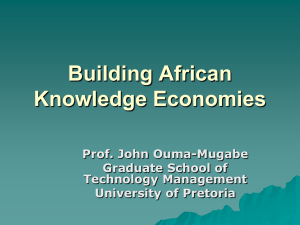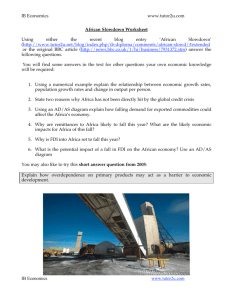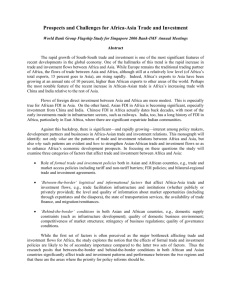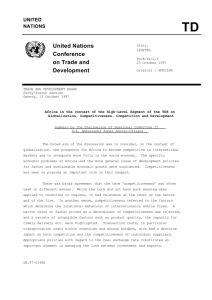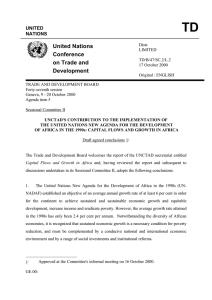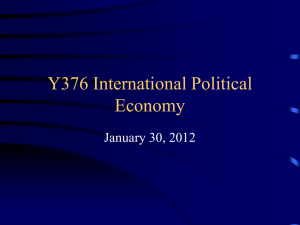TD United Nations Conference
advertisement
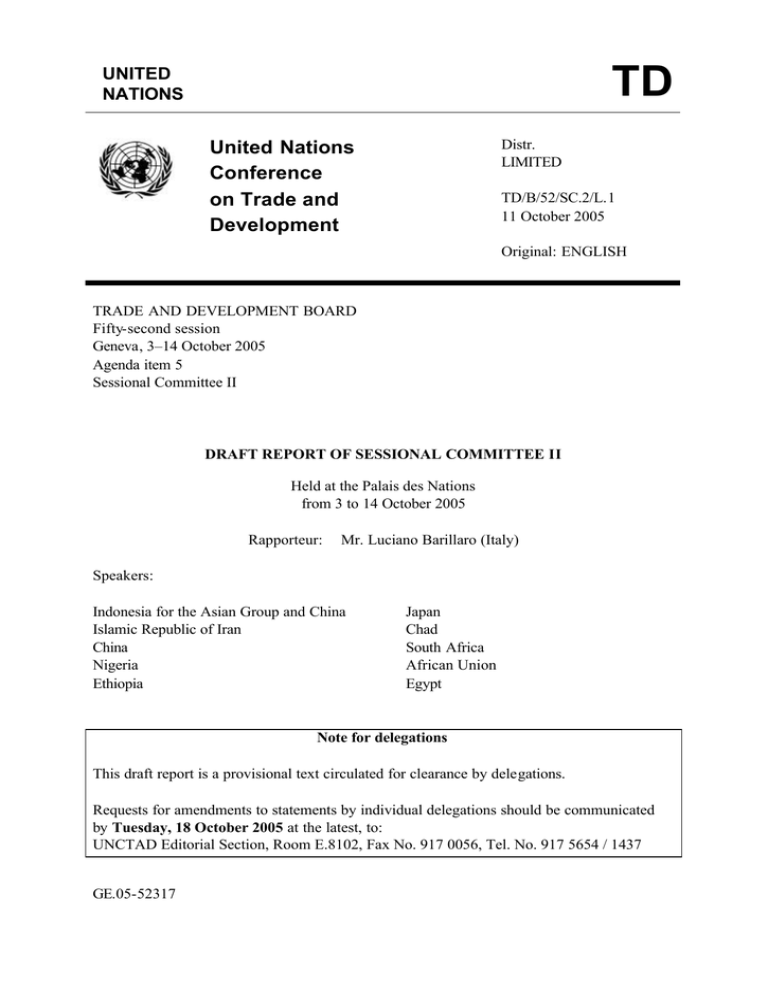
TD UNITED NATIONS Distr. LIMITED United Nations Conference on Trade and Development TD/B/52/SC.2/L.1 11 October 2005 Original: ENGLISH TRADE AND DEVELOPMENT BOARD Fifty-second session Geneva, 3–14 October 2005 Agenda item 5 Sessional Committee II DRAFT REPORT OF SESSIONAL COMMITTEE II Held at the Palais des Nations from 3 to 14 October 2005 Rapporteur: Mr. Luciano Barillaro (Italy) Speakers: Indonesia for the Asian Group and China Islamic Republic of Iran China Nigeria Ethiopia Japan Chad South Africa African Union Egypt Note for delegations This draft report is a provisional text circulated for clearance by delegations. Requests for amendments to statements by individual delegations should be communicated by Tuesday, 18 October 2005 at the latest, to: UNCTAD Editorial Section, Room E.8102, Fax No. 917 0056, Tel. No. 917 5654 / 1437 GE.05-52317 TD/B/52/SC.2/L.1 page 2 ECONOMIC DEVELOPMENT IN AFRICA: THE ROLE OF FOREIGN DIRECT INVESTMENT IN GROWTH AND DEVELOPMENT (Agenda item 5) 1. For its consideration of this item, the Board had before it the following documentation: Economic Development in Africa: Rethinking the Role of Foreign Direct Investment (UNCTAD/GDS/AFRICA/2005/1) 2. The representative of Indonesia, speaking on behalf of the Asian Group and China, said that the secretariat's analysis of the impact of FDI in Africa highlighted the fact that there was no panacea for development, and that one policy tool alone could not help developing countries overcome their development challenges. Other policy instruments must complement FDI in order to generate the resources necessary for development, and policies to attract FDI must be balanced with others in the areas of trade and finance in order to reach a healthy equilibrium of policies. Furthermore, this equilibrium must be supported by an enabling international environment that complemented a sound approach by African countries at the domestic level. Do mestic policies of developing countries could be developed and implemented only if the latter had adequate policy space to tailor development strategies to their particular needs and circumstances. Development coherence included progress on fronts other than FDI, such as reform of the international financial architecture and progress in the WTO Doha Round. Thus, the Asian Group and China welcomed the recent debt relief initiative, resulting from the Gleneagles Summit, to cancel multilateral debts of the heavily indebted poor countries, and to increase aid by $49 billion a year by 2010. It was encouraging that these proposals had been endorsed at the Millennium Plus 5 Summit, and reiterated at the recent autumn session of the World Bank and the IMF. UNCTAD should continue its work in the area of debt, including the study of the application of debt-for-equity swaps for development. One proposal presented at the Millennium Plus 5 Summit was to convert half of the foreign debt of 100 heavily indebted and middle- income countries into funds for antipoverty programmes in the areas of reforestation, mass housing, energy, eco-tourism, irrigation and post-harvest facilities, land reclamation, agricultural productivity and wealthcreating projects. The delegate highlighted South–South cooperation as an avenue TD/B/52/SC.2/L.1 page 3 complementing traditional approaches to Africa's development. The experiences of successful developing countries could provide lessons that could help further tailor development policies in Africa. In addition, the GSTP could yield concrete dividends. The Asian Group and China were hopeful about achieving greater cooperation as a result of the New Asian-African Strategic Partnership (NAASP) agreed at the Asian-African Summit held earlier this year, together with UNCTAD's support for future initiatives in operationalizing the NAASP. 3. The representative of the Islamic Republic of Iran noted that despite their efforts to create an environment conducive to promoting trade and development, the African countries had encountered many difficulties in achieving the Millennium Development Goals. They were facing increased poverty, a stagnant economic situation and a slowdown in economic growth resulting from the debt crisis of the early 1980s. The recommended adjustment programmes had paid little attention to the specificities of Africa's conditions, such as its colonial history and its continuing legacy, which had made the exports of this continent dependent on the markets of a small group of countries. This was intensified eve n further by limited intraregional trade and small domestic markets. Even though the export sector had managed to attract FDI, it had failed to establish sustainable linkages with other sectors of the economy such as industry and manufacturing. Three areas of interaction could be identified for action to improve the situation. First, African countries should be able to formulate plans and policies based on their specific conditions. The flow of FDI should not only target specific sectors, but also aim at reaching stream activities which could result in a stronger manufacturing and industrial sector in those countries. Second, it was necessary to achieve greater regional coordination in the fields of taxation and incentives for FDI in order to prevent a "race to the bottom" and to expand production capacities in those countries through intraregional trade. Major African economies had an important role to play in this process. Third, as had already been mentioned, FDI flows were concentrated in regions that had the necessary infrastructure in place and dynamic manufacturing and industrial sectors. It was important that other African countries be included in this process. Hence, policies for promoting domestic firms' capacities and taking the necessary measures to diversify their economies should be put in place. That was why a higher level of ODA and technical cooperation was needed in order to strengthen the capacities and institutions of these countries. TD/B/52/SC.2/L.1 page 4 4. The representative of China said that the report on econo mic development in Africa was very constructive, and analysed the utilization of FDI by African countries. Unfortunately, since the debt crisis in early 1980, the external environment of African countries had experienced a rapid deterioration, with major blows to manufacturing industries, sluggish investment, an increasing debt burden, limited improvement of infrastructure, product diversification and income growth. All these factors had contributed negatively by further reducing the attractiveness and the quality of the utilization of Africa's FDI. That was why the international community needed to adopt specific and targeted measures to help improve the investment climate in this continent. China attached great importance to African development, as shown at the recent UN Summit, at which President Hu Jintao had announced five measures to support developing countries, especially African and least developed countries. Chinese enterprises were encouraged to invest in cooperative projects in Africa in fields ranging from trade, production, resource exploitation and transport to agriculture and further processing of agro-products. By June 2005, Chinese total direct investment in Africa had reached $1.025 billion. Furthermore, China had concluded an agreement for the promotion and protection of investment with 25 African countries and for the avoidance of double taxation and prevention of tax evasion with eight others. China had also provided assistance and support in various fields by training 2,526 persons in 2004, and was expecting to train up to 3,800 by the end of 2005. An important role was played by the China-Africa Cooperation Forum, especially in facilitating visits by the Chinese and African trade and economic communities, and urging Chinese companies to invest and cooperate in Africa. China had cancelled or reduced part of Africa's debt to China, some 31 HIPCs having had their debts cancelled, and had granted duty-free treatment to African exports to China. Moreover, China was ready to cancel $10 billion of African debt. 5. The representative of Nigeria said that how to get Africa out of its poverty cycle had long occupied the attention of policymakers at the national and international levels. While the strategy of taking advantage of FDI inflows had been successful in other developing countries, this had not been the case in Africa. The secretariat's report identified major factors responsible for Africa's failure: poor governance, geography and distance from leading markets, low population density, harsh climatic conditions, and the fact that some of its countries were landlocked. To these factors the speaker added the people's low purchasing power. His delegation agreed with the report's view that the lingering colonial heritage TD/B/52/SC.2/L.1 page 5 linking African countries to their erstwhile colonial metropolises had tied these countries to dwindling markets rather than allowing them to expand to other established and emerging markets, and consequently limited their options in terms of trade and access to capital. Africa's ina bility to benefit from FDI was also due to low capital formation and deindustrialization, which were observable effects of structural adjustment programmes, unrestrained capital flight through profit repatriation, debt and lack of well- articulated policies determining sectoral application of FDI. Regarding the extractive industry, which the report dealt with in depth, the speaker explained that his country had been a major beneficiary of FDI in the oil industry, and had had to contend with the dilemma of balancing the profit motive of the TNCs with inward- looking programmes such as those relating to environmental awareness. However, this was being addressed through specific policy formulations. 6. The report also highlighted the dilemma of African countries accepting FDI and invariably foreclosing effective competition in the relevant industry, which might be dealt with through policy realignment in a managed liberalization process that took into consideration the specificities of the African situation. The speaker welcomed the report's views on the benefits of economic integration and its call for agreement on the nature and extent of tax breaks and other incentives for foreign investors. To what extent any such agreement could hold in the scramble for limited FDI remained debatable, however. 7. The representative of Ethiopia fully associated his delegation with the statements made by the Group of 77 and China, the African group and the LDC group. He said that Africa was faced with daunting development challenges, and was the only region in the developing world where extreme poverty prevailed. On current trends it was feared that the continent would fail to achieve more of the MDGs than any other developing region. The continent had been not enjoyed the benefits brought about by globalization, as manifested in its shares – the lowest of all – in global FDI, trade, financial flows and global GDP. For FDI programmes to be effective, cost-benefit analysis should be carried out properly. Africa had to persevere with its efforts to create much stronger foundations for tackling its problems. However, because of the multiplicity of the problems, it needed the solidarity of its development partners. Africa needed to work closely with UNCTAD to diagnose the core development challenges. It needed to diversify its exports, retain policy space and strengthen regional cooperation to tackle its economic problems. The subprogramme for Africa should TD/B/52/SC.2/L.1 page 6 continue, as in this report, with its critical and focused analysis of issues of interest to Africa and suggest the way forward. 8. The representative of Japan said that in the light of the importance of economic development in Africa, his Government had initiated in 1993 the TICAD (Tokyo International Conference on African Development) process, with a view to sharing Asian experiences with African countries. The TICAD meetings had taken place every four years, with the leaders of African States and heads of relevant international organizations participating. Most recently, in November 2004, a TICAD Trade and Investment Conference had taken place in Tokyo, where the Japanese Government had announced its intention of inviting 10,000 Africans over the next four years for training in capacity-building. 9. Praising UNCTAD's Africa report for its excellence, the speaker said that it was full of ideas for development strategies, significantly contributing to the international discussions on the development of African countries. He supported in particular the recommendations of the report, as they were holistic in their approach with the emphasis on strategic industrial policy, together with regional efforts for creating a better investment climate. However, he questioned the report's support of performance requirements, in particular local content requirements. Bilateral investment treaties of the United States, Japan and Canada did not prohibit a set of performance requirements, such as export requirements, employment requirements for local workers, technology transfer requirements and the like, so that investment recipient countries could maintain some policy space. Every WTO member State should abide by the WTO TRIM principles, which stipulated local contents only to a very limited extent. Regarding UNCTAD's investment-related activities, the speaker suggested that the secretariat further expand the discussion on investment agreements in the light of the increasing importance of such agreements, and explore possibilities of establishing a mechanism to assist developing countries in resolving investment disputes. 10. The representative of Chad associated his delegation with the comments made by the African and LDC groups, and praised UNCTAD's Africa report as a remarkable and detailed analysis, which identified the advantages and disadvantages of FDI particularly in situations of low domestic savings and heavy dependence on exports of primary commodities, which pertained in Africa. FDI did not play a positive role in those economies because of the TD/B/52/SC.2/L.1 page 7 enclave nature of the sectors to which it was attracted. This required the implementation of programmes to ensure that FDI fulfilled its role as an engine of growth. In the light of the secretariat's report and the conclusions of the Africa Commission Report and others, the development partners should redirect their technical assistance programmes to help Africa fight effectively against poverty in order to attain the MDGs. 11. The representative of South Africa associated his delegation fully with the statements made by the Group of 77 and China, the African group and the LDC group. The review of the world economy and the new interdependence that prevailed had helped the participants in understanding current global situations. Recent global economic trends called for major policy initiatives, for example for export diversification, investment in infrastructure and control of price volatility. Despite the increased demand for commodities and the resultant high prices, gains were accruing to only a few countries. Income earned from these gains could be reinvested in local development with appropriate policies. The share of profits earned by government from FDI operations was insignificant, the result of a "race to the bottom". This situation had to be reversed if the gains from the FDI were to be made concrete. Although a marked liberalization, and deregulation and privatization policies, had been implemented, FDI inflows to Africa as a proportion of total developing country inflows had declined. The fiscal impact of FDI was slight, and the inflows had not been able create jobs, establish linkages with the rest of the economy and transfer technology. Corporate social responsibility for development by TNCs in Africa, which entailed maximizing TNCs for the economic and social development of host States, was imperative. The ideas contained in the São Paulo Consensus, and further mandated by the Doha Plan of Action of the Second South Summit in June, needed to be operational through the work of relevant institutions such as UNCTAD. His delegation fully agreed with the report on FDI issued by UNCTAD. 12. The representative of the African Union said that the Africa report contained an enlightening and well- thought out technical analysis of the policies of African Governments for attracting FDI, including those on privatization and deregulation. It examined their results in relation to the expected benefits, such as job creation, technology transfer and creation of linkages with the rest of the economy, as well as fiscal revenue generation. The report also made pertinent observations on the effects of FDI, or a lack of FDI, on economic growth and poverty reduction. Its findings were quite sobering: the African continent received very low TD/B/52/SC.2/L.1 page 8 levels of FDI flows, mostly in the extractive sectors. The benefits of FDI had not been forthcoming, partly owing to its capital- intensive nature, and only a very small portion of exports related to FDI accrued to the host countries as a result of the "race to the bottom" incentives. In the light of these findings, the report called for a rethinking of FDI policies lest the "race to the bottom" keep Africa at the bottom in perpetuity. It deserved to be acted on by the UNCTAD secretariat and the Commission of the African Union. Such actions should be appropriately factored into UNCTAD's work in consensus-building and technical cooperation, including the Investment Policy Reviews for, and bilateral and regional investment treaties concluded by, African countries. 13. The report had been brought to the attention of the relevant authorities of the Commission, and the cooperation of the UNCTAD secretariat was expected as the African Union would embark on an attempt to enhance the ability of Africa to obtain the maximum benefits from its natural resources. With a view to the creation of an external environment conducive to African development, the speaker called on development partners to strengthen their commitment to the regional efforts to reduce poverty. He said that the UNCTAD position was now the mainstream one, pointing out that the outcome of the recent G8 summit corroborated the conclusions reached earlier by the secretariat. Encouraging the secretariat to continue to serve Africa's cause diligently, he was hopeful that local efforts and complementary external support would ensure that African countries went a long way towards meeting the target of halving the incidence of extreme poverty by the year 2015, as agreed at the Millennium Summit. 14. The representative of Egypt emphasized the willingness for the interactivity and partnership mentioned by the representative of the United Kingdom. Commenting on the constant reference to "political space", he said that the economic tools that had been available 30 years ago were no longer available, and gave as an example the African Group's proposal in respect of TRIMS (trade-related investment measures) at the WTO, where there was not enough flexibility to make countries pursue their investment and trade policies. UNCTAD needed to accommodate these requests and proposals to ensure proper functioning of policy space. Many bilateral investment agreements had caused a large number of disputes since they did not consider the national political space contexts. Industrial policy was a crucial issue, as no one could industrialize without developing an industrialization policy first. TD/B/52/SC.2/L.1 page 9 Consequently, UNCTAD had to speak with one voice – the voice of development – to ensure that developing countries had the policy space to pursue their development strategies. 15. The speaker then referred to the issue of international corporations, which had been granted so much independence, while sovereign African countries could not act independently. As TNCs were the main beneficiaries of globalization, they should play a role in development, with their increasing rights being matched with increasing responsibilities. Furthermore, they should be encouraged to transfer technology, reinvest their revenues and upgrade their human capacity. South–South relations had their own roles to play, but the main role in the development process was to be played by the developed countries – that is, the systemic responsibility of the international economic system rested on the shoulders of the major nations. Consequently, the responsibilities of North and South in this connection were, and must be, acknowledged. The positive discourse on development had to be translated into positive action and policies in documents. *** ** ***

